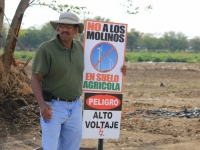Renewable Energy Projects Generate Opposition in Puerto Rico

Puerto Rican citizen groups are protesting two renewable energy projects: a 30 megawatt solar energy project in Yabucoa by Western Wind Energy corporation from Vancouver and a 75 megawatt windmill array in Santa Isabel by Pattern Energy of San Francisco.
In an era of "extreme energy" extraction when fracking for natural gas can cause earthquakes, producing oil from tar sands cause "areas of wilderness the size of small countries (to be) chewed up and replaced by a landscape of toxic lakes, open pit mines, refineries, and pipe lines" and the destruction of entire mountains for coal uses "the explosive equivalent of a Hiroshima bomb is detonated every week in Appalachia," it might seem odd to protest solar and wind - which are typically considered two of the most environmentally friendly sources of energy.
Some past protests against solar and wind are definitely examples of the "Not In My Back Yard" syndrome, where home owners have objected to "unsightly" solar panels on roof tops and electricity poles.
Yet other activist groups have much more considered objections against big solar and wind projects. For example, the North American Platform Against Windpower (NA-PAW) and the European Platform Against Windpower (EPAW) have brought together communities opposed to wind farms for much more substantial reasons. Activists are also starting to speak out against sprawling solar farms in the Mojave Desert in California.
In Puerto Rico, the Agricultural Rescue Front (FRA), a local citizen group, says the Pattern Energy and Western Wind Energy projects will be much more than just unsightly - they will destroy scarce farm land in the food-dependent Caribbean island.
The 3,435 square mile island of Puerto Rico has a population density of over 1,100 people per square mile (one of the world's highest population densities) and produces perhaps as little as 15 percent of its food, according to Myrna Comas, a University of Puerto Rico professor and one of the island's most outspoken local food security advocates.
Even this minimal production is at risk - data from the U.S. Agricultural Census indicates that Puerto Rico lost 19 percent of its farmland between 2002 and 2007.
Yet it is not for lack of potential - indeed, the fertile lowlands of Santa Isabel are classified as prime farmland by the U.S. Department of Agriculture. Only three percent of the world's soils have this classification, according to FRA. Santa Isabel farms produce mangoes, melons, onions, peppers and tomatoes, and support around 3,000 jobs, according to the Puerto Rico Farm Bureau (Asociación de Agricultores).
This is where Pattern Energy has started the construction of an array of between 44 and 65 windmills in the municipality of Santa Isabel, which are expected to generate 75 megawatts and power 25,000 homes.
Bulldozers and other large machinery are already moving topsoil and compacting it, destroying the fragile ecology. "The project will impact between 3,500 and 3,700 cuerdas. (3,700 cuerdas equals 3,594 acres)," says Warys Zayas, a University of Puerto Rico student and FRA spokesman. "The area affected will include not only the windmills' bases, which together would occupy 21 cuerdas, but also the area within a radius of 1.6 kilometers of each windmill base."
Six FRA activists were arrested in December at the windmill project site for trespassing and attempting to disrupt the construction. They have a court hearing this month.
Similar objections are being raised at the Western Wind Energy corporation's planned 30 megawatt solar energy project in Yabucoa, to the island's east. Local residents are up in arms because they say the $150 million project will take over 400 acres of the Yabucoa agriculture reserve, which was set aside by the Puerto Rican government solely for farming.
Earlier this month the project's opponents testified at a public hearing in the town center. Various organizations, including the Yabucoa Pro-Quality of Life Committee (Comité Yabucoeños Pro Calidad de Vida), the Puerto Rico Agronomists Association (Colegio de Agrónomos), the Puerto Rico Farm Bureau, the FRA, and the Yabucoop cooperative, testified against the project.
The only person to speak in favor was Yabucoa mayor Angel S. GarcÃa.
- 107 Energy



